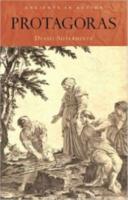
Bloomsbury Academic (2015) p/b 93pp £14.99 (ISBN 9781472510921)
On the cover blurb, Steven Smith commends this book as ‘short, elegant, and readable’. I agree with two of these epithets. Protagoras, who survives for us in a few quotations, two of them infamous and oft-quoted, and an extensive portrait in Plato, is an important, but mysterious early thinker. In this short work, S. tries to dig deeper into his equivocal reputation. Those who expect some light to be shone, however, will find Protagoras’ reputation no less equivocal.
In three chapters, S. covers Protagoras’ beginnings as a thinker, his influence on Pericles and his ‘secret teaching’. Protagoras’ association with the early atomist thinker, Democritus, seems to be a canard, as the dates simply do not fit and only later writers report it; S., although he seems to acknowledge the problem (‘Legend recounts…’, p.3), starts a disquisition on physics, which allows him to introduce sophistic thought in general, before coming back to Protagoras qua sophist. Many of Protagoras’ saws about education are uncontroversial, but S. moves quickly onto Plato and builds a detailed picture from the famous portrayal in his eponymous dialogue.
The third chapter develops the examination of Protagoras’ thought from exclusively Platonic evidence, to the point where S. seems to forget, in his exegesis, that the Protagoras we see in Plato is a clever and plausible construct designed to be a foil for Socrates; his undoubted relativism was, of course, anathema to both Plato and Aristotle.
The most interesting idea proposed by S. is that Pericles’ political volte-face, as he has it, in 462 BC can be laid at Protagoras’ door; the aristocratic scion of the Alcmaeonids becomes the convinced democrat after philosophical discussion with Protagoras. This is an attractive thesis, supported by a fair and reasoned description of the development of democracy in Athens. Pericles’ ‘overzealousness’ is also blamed on Protagoras’ relativistic approach to ethics, as well as to politics.
S. finishes with a chapter which claims that Protagoras had one set of teachings which he was prepared to air in public discourse, but a quite different, more subversive one which he taught to his students. S.’s fault here is that he makes next to no allowance for Plato’s purpose and motivation.
I enjoyed this book, but felt that I learnt comparatively little about Protagoras, though I doubt whether an accurate picture of him as a thinker can ever emerge. The book is, indeed, short and readable, but would have benefited from more careful proofing, while the English is sometimes a little inelegant.
Terry Walsh—Ratcliffe College
